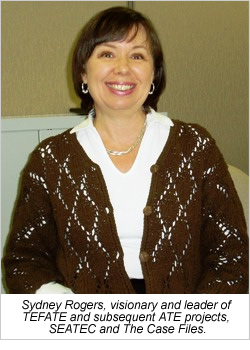
The Tennessee Exemplary Faculty for Advanced Technological Education (TEFATE) project began with a goal to improve technological education through the development of a new Associate of Applied Science (A.A.S.) curriculum in communications technology. To accomplish this goal, a group of faculty and administrators from across Tennessee proposed a comprehensive system of faculty and curriculum development, believing that a focused and concurrent effort would achieve the best result.
Recognizing the need to develop fresh approaches for teaching, the development team explored ways in which faculty could learn to bring the workplace into the classroom. The critical features of this process were to create a process that
(1) ensures that students learn the necessary content,
(2) incorporate ways to apply the content to real-world problems, and
(3) encourage continuous learning as change occurs.
Important components of the TEFATE project included: interdisciplinary faculty teams, partnerships with business and industry, faculty internships in industry, and a DACUM study to structure the curriculum development effort.
In addition, faculty development activities were conducted in the areas of communications, technology, leadership and teamwork, critical thinking, case study development, active/cooperative learning strategies, and an introduction to problem-based learning.
One of the most exciting outcomes of the project was the development and the use of case studies in technological education. In seeking a vehicle to bring the workplace and multiple academic disciplines together, the development team chose the case study format. They soon discovered that there were few models for the use of this method in technological education, although many examples existed in diciplines such as business, law, medicine, and education.
This discovery led to a focused effort to learn more about the development and implementaion of case studies and to refine this method for use in teaching technical content. Interdisciplinary devleopment teams at five two-year colleges began to adapt situations encountered during site visits and internships in industry into actual case studies to be integrated into the courses that they teach. From this effort 25 case studies were created.
As a result, the work continued with a more structured effort to define case study models for use in technological education. National forums on the use of case studies were conducted in early 1999 to bring together experts in the use of case studies from different disciplines. The outcome of these forums provided the necessary foundation for new models of development and use of case studies in technological education.
At the conclusion of the two-year TEFATE project evaluators concluded that the cases and professional development experiences for the faculty “represent the cornerstones for much further work with the potential for significant impact on the tools and strategies for teaching and learning in content areas which emphasize technology” (TEFATE Summary Proceedings.) The subsequent SEATEC project, followed by The Case Files project verifies the accuracy of their conclusion.


